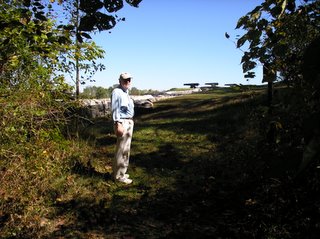
My husband has just brought it to my attention that Horace was not a Greek - that he was a Roman. Big error. My apologies. I thanked him for correcting me. Men can be useful in the most interesting ways.
Here's a little article about Horace just for fun.
HORACE (65-8 B.C.)
QUINTUS HORATIUS FLACCUS, known in English as Horace, was born at Venusia, near the border of Apulia, in 65 B.C. His father, a former slave who had freed himself before the birth of his son, sent him to school in Rome. As a young man Horace went to Athens and studied philosophy at the famous schools. When the Civil War broke out he enlisted in the army of Brutus, served at Philippi, and came back to Rome not long after. Deprived of his property as a result of the proscriptions, he began life anew at the age of twenty-four as a clerk in a public office. Not long after, he attracted the attention of Mæcenas, and soon became acquainted with Varius and Virgil, henceforth devoting himself to literary pursuits. His first work, the first book of Satires, was published in 35 B.C. About a year later, Mæcenas presented him with the celebrated Sabine Farm, and Horace was at liberty to the end of his life to do as he liked. Before he died he was famous: the Emperor Augustus commissioned him to write the fourth book of Odes. He died eight years before the birth of Christ.
The Epistle to the Pisos, or Art of Poetry, has been assigned by various authorities to the period between 24 and 7 B.C. Professor Nettleship (in his Lectures and Essays) believes it to have been written between 24 and 20 B.C. Its interest and value are considerably enhanced in view of the fact that it is, in Professor Saintsbury's words, "the only complete example of literary criticism that we have from any Roman." It is significant that the greater part of its subject-matter is concerned with the drama. While it has been clearly substantiated that Horace drew upon a non-extant treatise by Neoptolemus of Parium, an Alexandrian critic of uncertain date, the fact that Horace made use of and molded the ideas of his predecessor is important. The Art of Poetry is on the whole a somewhat arbitrary manual; the greatest importance is there attached to the purely formal side of writing; the dramatist must adhere closely to the five acts, the chorus, and son on; proportion, good sense, decorum, cannot be neglected. Of the practical value of the work before the Renaissance, it is impossible to know; of its influence since that time, it can only be said that it was as widespread as that of Aristotle. Horace's doctrine of "pleasure and profit" was to be repeated innumerable times, and is still a criterion of criticism. Mr. Spingarn's statement that "critical activity in nearly all the countries of western Europe seems to have been ushered in by the translation of Horace's Ars Poetica into the vernacular tongues" is but another proof of the popularity of the work.
This article was originally published in European Theories of the Drama. Barrett H. Clark. Cincinnati: Stewart & Kidd Company, 1918.
Now the project is to present this to very young children as an interesting subject. It takes a little thought, but since we are doing puppetry this month, and puppet shows are tiny plays, it will be interesting to see how much of this we can teach and be interesting. The reach is so long, the process is so much fun, and the end product is a marvelous milestone.

No comments:
Post a Comment